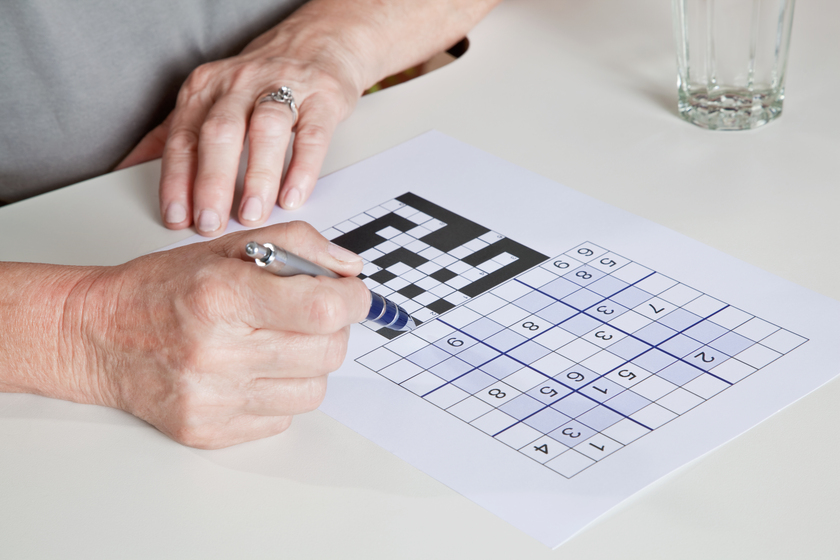Memory loss is a common concern as your loved ones enter their golden years. Many strategies claim to combat this cognitive decline, but are they all effective? One method often touted as a memory booster is solving crossword puzzles. In this article, we’ll explore the relationship between playing crosswords and preventing memory loss, investigating whether it’s a proven fact or just a popular myth. Join us on this journey to uncover the truth about maintaining cognitive function and memory in retirement communities.
The Science of Memory Loss
Before delving into the impact of crossword puzzles on memory, it’s essential to understand the science behind memory loss. Memory decline is a natural part of the aging process, and it can manifest in various ways, from forgetting names to misplacing keys. However, some individuals experience more severe forms of memory loss, such as Alzheimer’s disease or dementia, which significantly affect daily life.
Memory function is a complex interplay of various cognitive processes, including encoding, storage, and retrieval. As we age, changes occur in the brain that can impact these processes. Structural changes, such as the shrinkage of brain cells, and chemical changes, like alterations in neurotransmitter levels, can contribute to memory decline. These changes are a natural part of the aging process, but the rate and severity of decline can vary widely among individuals.
The Role of Cognitive Engagement
One theory behind crossword puzzles and memory is the concept of cognitive engagement. Engaging in mentally stimulating activities is believed to help maintain and enhance cognitive function. Crossword puzzles, with their intricate wordplay and pattern recognition, seem like an ideal candidate for this purpose.
The Benefits of Crossword Puzzles
Crossword puzzles offer several potential benefits that could contribute to cognitive health:
- Mental Stimulation: Solving crosswords requires the brain to actively process information, recall words from memory, and make connections. This mental workout can help keep the mind sharp.
- Vocabulary Expansion: Crosswords often introduce new words and phrases, promoting vocabulary growth. Learning new words can be beneficial for memory and language skills.
- Pattern Recognition: Identifying patterns within the puzzle grid and clues can enhance problem-solving skills, which are crucial for memory and cognitive function.
- Stress Reduction: Engaging in enjoyable activities like crosswords may reduce stress, which can have a positive impact on overall brain health.
Research Findings
Research on the relationship between crossword puzzles and memory is mixed. While some studies suggest a potential link between cognitive engagement activities like puzzles and a lower risk of cognitive decline, others are less conclusive. It’s important to note that not all crossword puzzles are created equal. Some are more straightforward, while others are highly intricate and challenging. The level of cognitive engagement required may vary significantly, potentially impacting the potential memory benefits.
The Complexity Factor
One important consideration is the complexity of the activities involved. Not all crossword puzzles are created equal. Some are more straightforward, while others are highly intricate and challenging. The level of cognitive engagement required may vary significantly, potentially impacting the potential memory benefits.
The Importance of Variety
It’s worth noting that cognitive health is not solely dependent on one activity. Variety in mental stimulation is key. Encouraging your loved ones in retirement communities to engage in a range of mentally stimulating activities, including reading, puzzles, games, and social interactions, may be more effective in maintaining cognitive function.
The Role of Social Interaction
Social interaction is another vital factor in cognitive health. Engaging in puzzles and games with others fosters social bonds and stimulates the brain through conversation and collaboration.
Fact or Myth?
So, can playing crossword puzzles prevent memory loss? The answer is nuanced. While crosswords and similar activities may offer cognitive benefits, they are not a guaranteed defense against memory decline. The effectiveness of such activities depends on factors like complexity, variety, and overall lifestyle.
Encouraging your loved ones in retirement communities to enjoy crossword puzzles can be a fun and stimulating activity that may contribute to their cognitive well-being. However, it’s essential to view it as just one piece of the puzzle. A holistic approach that includes a balanced diet, physical exercise, social interaction, and regular mental stimulation is more likely to have a positive impact on memory and cognitive function.
The relationship between playing crossword puzzles and preventing memory loss is a complex one. While it may not be a one-size-fits-all solution, incorporating crosswords into a broader strategy for maintaining cognitive health can be a valuable and enjoyable pursuit for your loved ones in their golden years. Remember that the journey to healthy aging involves a combination of factors, and supporting your loved ones in retirement communities through a well-rounded approach is the best way to promote their cognitive well-being.







